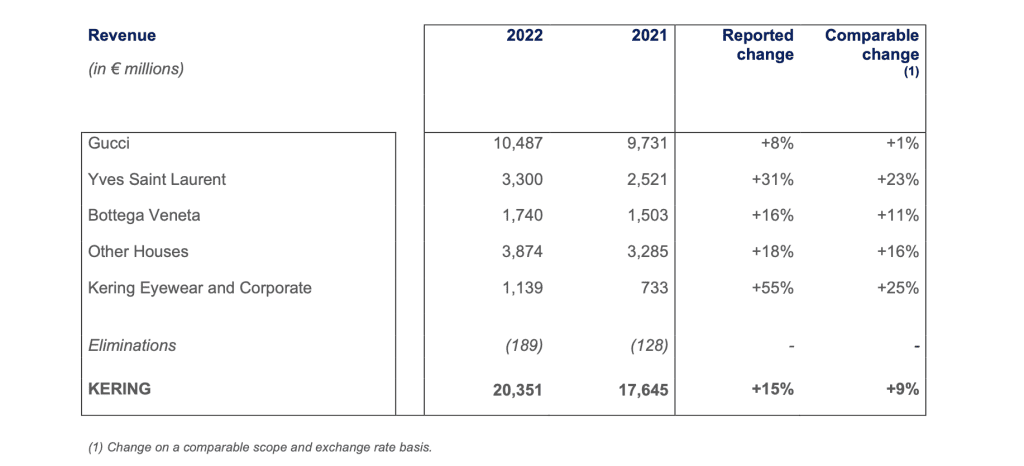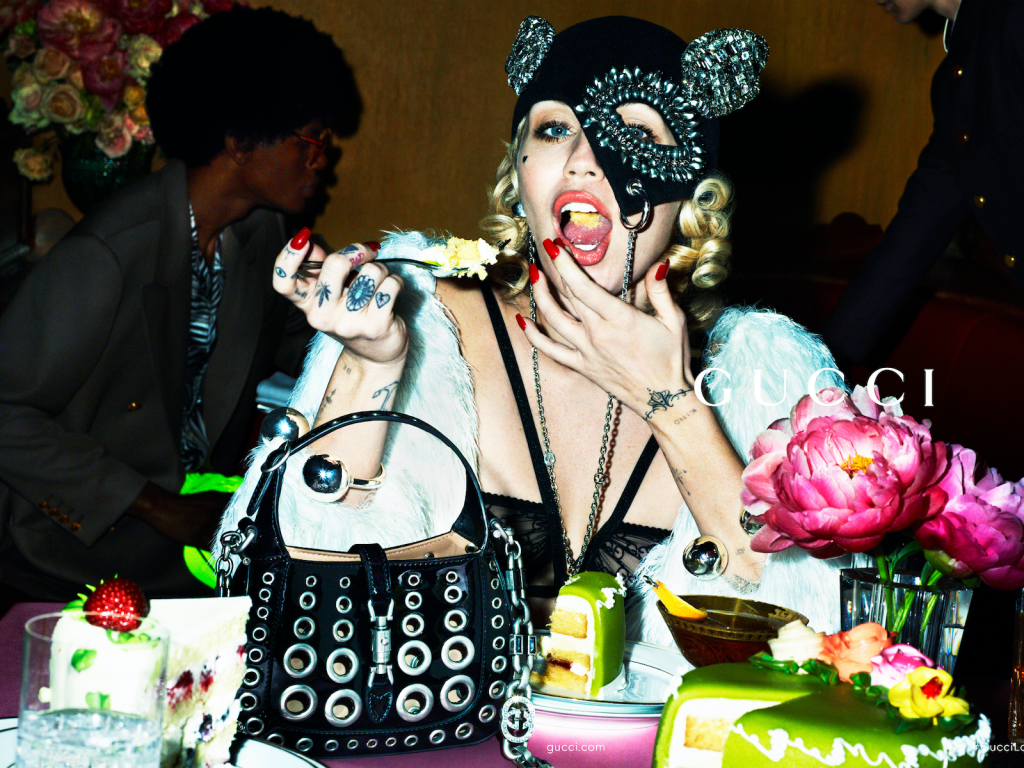Revenue for Kering reached 20.4 billion euros ($21.8 billion) in 2022, an increase of 15 percent from the year prior as reported and 9 percent on a comparable basis, while net profit amounted to 3.6 billion euros ($3.85 billion), up 14 percent year-over-year. The French luxury goods group – which owns Gucci, Balenciaga, Bottega Veneta, and Saint Laurent, among other brands – reported that revenues from its directly operated retail network, which includes e-commerce sites, rose 10 percent on a comparable basis in 2022, driven in particular by Western Europe and Japan. As for the fourth quarter of 2022, results come in the form of “mixed performances” across its individual brands and geographic regions, per Kering, with total sales for the three-month period down 2 percent year-on-year as reported and 7 percent on a comparable basis.
Delving into its individual brands, Gucci generated 10.5 billion euros ($11.22 billion) in revenue in 2022 – which was a “challenging year,” Kering states – up 8 percent as reported and up 1 percent on a comparable basis. Sales in its directly operated retail network grew by 1 percent on a comparable basis. For the year, Gucci’s recurring operating income totaled 3.7 billion euros ($3.96 billion), and recurring operating margin was 35.6 percent, “notably reflecting investments aimed at nurturing the House’s future growth.”
Saint Laurent generated 3.3 billion euros ($3.53 billion) in revenue for the year, up 31 percent as reported and 23 percent on a comparable basis, which is “in line with the House’s ambitions,” according to Kering. Sales from the company’s directly operated retail network “rose sharply” to 28 percent, while wholesale revenue was also up by 6 percent (despite wholesale rationalization efforts). Management revealed that Saint Laurent has “achieved a material increase in profitability by surpassing the 3 billion euro mark,” with the next milestone being reaching 5 billion euro in revenue.
Meanwhile, Bottega Veneta had a “record year,” with revenue rising 16 percent as reported and 11 percent on a comparable basis to 1.7 billion euros ($1.82 billion). Growth was driven by the directly operated retail network, where sales rose 15 percent on a comparable basis. Numbers aside, Kering management stated that Bottega Veneta has “successfully raised its ultra-high-end luxury positioning,” and highlighted its timeless values, which are being further reinforced through initiatives, such as a lifetime warranty program for an array of its staple products. The long-term strategy for the brand involves making its distribution more exclusive, including by reducing its wholesale mix.
As for its Other Houses, namely, Balenciaga, Alexander McQueen, and Brioni, Kering reported 3.9 billion euros ($4.17 billion) in revenue, an increase of 18 percent as reported and 16 percent on a comparable basis. “Balenciaga had an excellent 2022, despite a difficult month of December. Alexander McQueen performed well in the handbags and ready-to-wear categories, and Brioni confirmed its recovery.”

Balenciaga’s “difficult” December was the result of its campaign controversy effecting sales in the U.S., the U.K. and the Middle East, Pinault said in a call on Wednesday; he said that sales in Asia were not impacted. Pinault also revealed that firings did not occur at Balenciaga in the wake of the problematic campaigns (creative director Demna, for example, is still in his role, as is CEO Cédric Charbit), as there was “no intentionality” on the part of the team behind the brand. “We’re allowed to make mistakes in a group like Kering. We’re not allowed to make the same mistake twice, but we have a right to make mistakes.”
“Despite the Balenciaga incident, management [said on the call that it] is committed to elevating the brand” and “rebuilding trust,” Bernstein stated in a note on Wednesday.
Finally, Kering Eyewear had a strong year, broking the billion-euro mark (up 58 percent as reported and up 27 percent on a comparable basis) to 1.1 billion euros and “confirming the validity of its strategy and boosted by the contributions of Lindberg and Maui Jim.” Its recurring operating income for the year was 203 million euros, 2.5 times the 2021 level.
Reflecting on the year, Chairman and CEO François-Henri Pinault stated on Wednesday that while all of the group’s brands “posted record revenues and contributed to higher operating income in 2022, these good performances were not uniformly up to our ambitions and potential.” Setting a less than stellar tone, he cited “challenges some of our Houses” – read: Gucci, thanks to underperformance, and Balenciaga, due to the child-centric ad campaign crisis – “faced, notably towards the end of the year.” But he asserted that the group is “convinced that we are pursuing the right strategy for the long term.”
The group’s CFO Jean-Marc Duplaix mirrored this tone, saying on the call that the group’s largest brand Gucci, in particular, “did not meet our expectations” in terms of 2022 performance, but that they could turn things around in 2023 with an emphasis on the brands’ heritage and improved strategy.
A big part of an impending boost will come by way of a revamp at Gucci, which named a new creative director, Sabato de Sarno, late last month. However, Jefferies analysts note that with de Sarno “not starting until Q2,” he will have “no real impact before the summer.” As for what can be expected under de Sarno, management said that the brand’s aesthetic will be “very different,” with “new energy and more connection to the heritage of Gucci brand.” In the meantime, Kering management says they will continue to invest in Gucci this year, including by way of existing brand elevation efforts, such as delivering higher price point products across all categories.
More immediately, changes will come from China reopening trends, which Jefferies analysts say “look very promising,” and may, alone, “offset higher CACs and spend related to the creative change” at Gucci, which is responsible for roughly half of the group’s total revenue and more than half (66 percent) of group operating profit.
In terms of what is ahead on the M&A front, Kering management said that it is “flexible and agile” when it comes to acquisition opportunities, noting specifically, though that they are planning to grow their increasingly-closely-watched beauty division organically, including with Bottega Veneta, Balenciaga, Alexander McQueen, Pomellato, and Qeelin.
The group’s latest woes have prompted renewed chatter about a potential future for Kering and fellow conglomerate Richemont, which owns a slew of hard luxury brands like Cartier, Officine Panerai, Piaget, and Van Cleef & Arpels, among others, and fashion brands like Chloé and Alaïa. “The two businesses’ combined market value is still less than half that of LVMH,” the WSJ’s Carol Ryan stated on Wednesday, but noted that “their portfolios are a good fit according to analysts at Bernstein Research,” as Kering’s expertise is in luxury fashion and leather goods brands, while Richemont has made its name with jewelry and watches.













